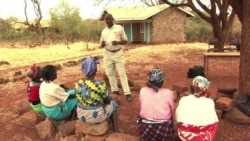It's the last day of school in Tharaka-Nithi, a community in Kenya’s remote former Eastern province. Classrooms are empty, signaling the start of a one-month break for students.
It’s also the most common period for female genital mutilation.
But here, as in some other African communities, females as young as seven face intense social pressure for the procedure. If they refuse to be cut, they risk stigma and victimization.
A few hundred meters away from the school compound, 12-year-old Mercy helps her mother with household chores. Mercy fears cutting but, unlike many young girls in this place, she knows her rights.
On several occasions, she has told her mother that if she even thinks of taking her to be cut, Mercy will report her to local authorities.
"My two daughters who have not been circumcised, I think they will finish their education," said Alice Karea, Mercy’s mother. "And now if you tell them to be circumcised, especially the elder one, she threatens me that she will report me to the chief."
In this community, girls who undergo the cut abandon school. Their culture holds that they’re mature enough for marriage.
Social mores contribute to the practice, said Tom Okeyo, a program manager for Plan International Inc.-Kenya, a nonprofit organization promoting children’s rights.
Once girls begin menstruating – some by age nine – “naturally, they are moving [to the] next stage in their development,” Okeyo said. The local community views the development as “a transition that makes you a woman.”
The procedure involves the partial or complete removal of female genitalia; it can cause problems from severe bleeding to urinary tract infections to infertility, the World Health Organization explains.
Fighting with education, penalties
Inside the local government compound, a local chief has called together a group of women circumcisers, warning them of penalties if they are found engaging in FGM.
"The chief has warned we will be arrested and jailed for three years," said circumciser Laurencia Kaburi, who cited an alternate fine of 200,000 shillings or $2,240. "We don't have that kind of money. So we will try our best not to circumcise girls."
But some parents remain eager to have their girls cut. Some in African and Middle East cultures believe FGM removes "unclean" body parts and reduces a female’s interest in "illicit" sex, the WHO explains.
No one knows if Kaburi and other women will be true to their words. It’s hard to resist the money offered by parents, especially when the women circumcisers have their own children and grandchildren to look after.
The WHO estimates that each year more than three million girls in Africa – primarily in western, eastern and northeastern regions – are at risk of mutilation.





